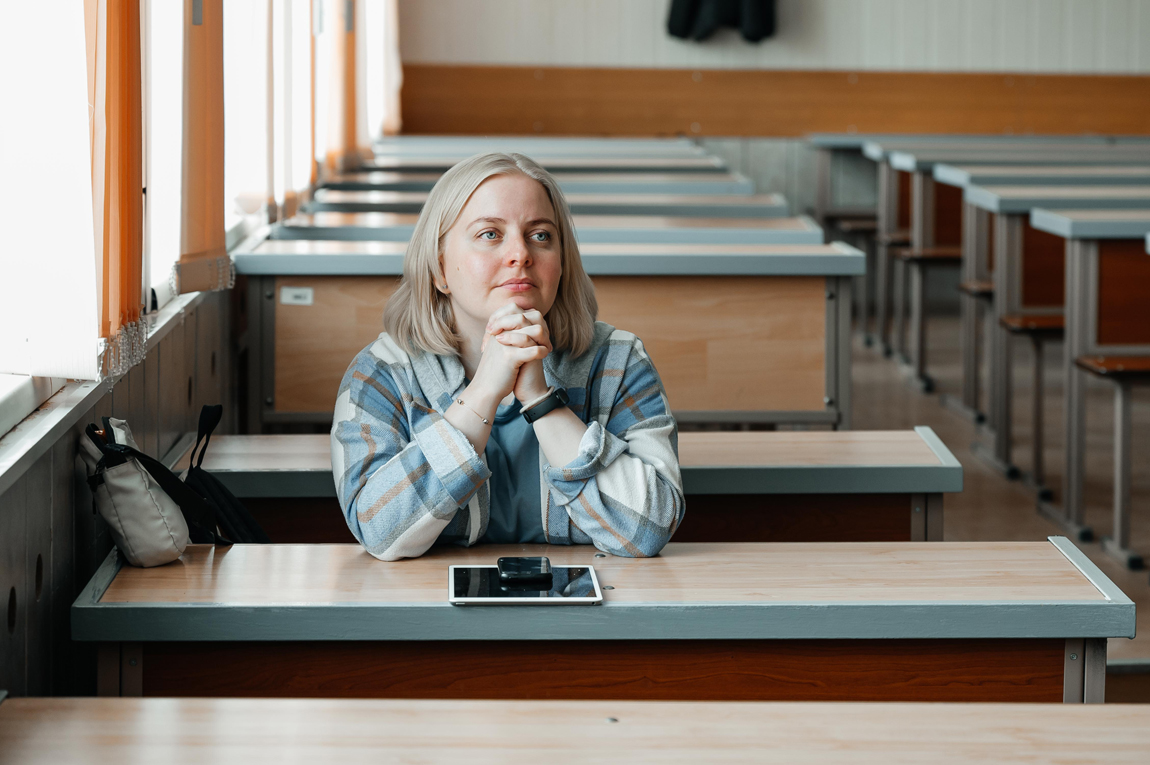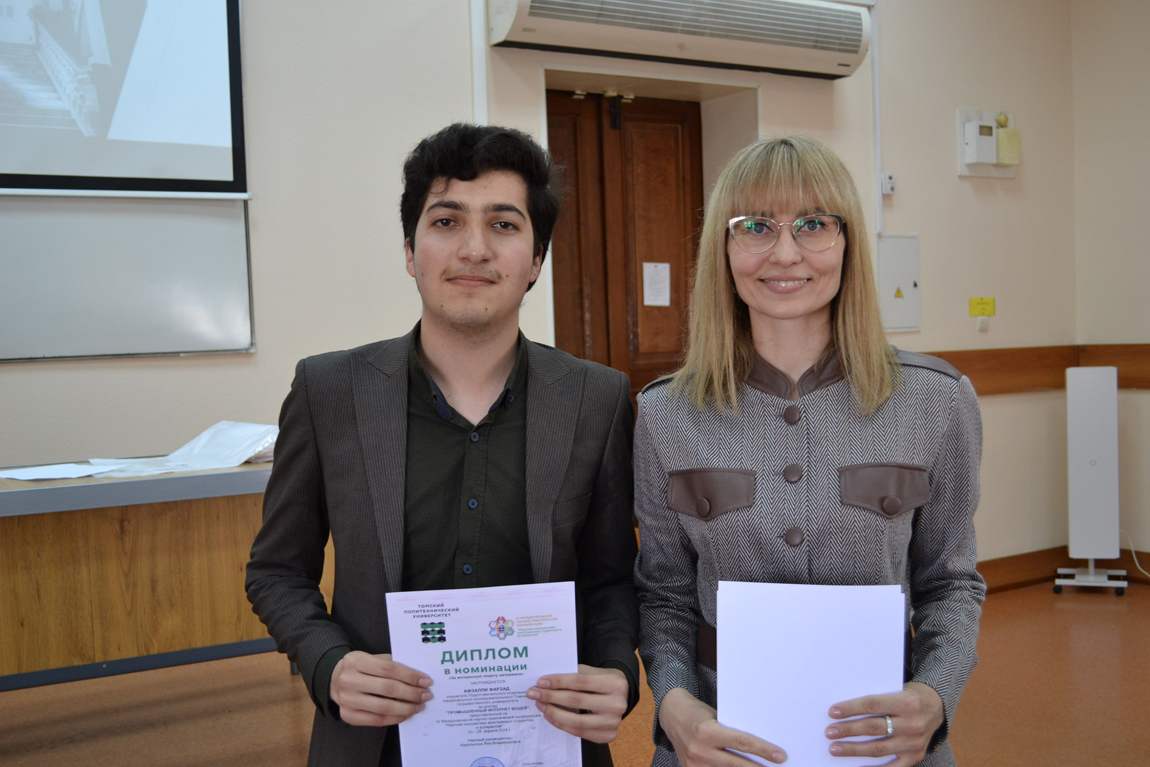HSE Prep Year Students Take Part in Conference in Siberia
April 23–25, 2024, international students of preparatory departments and faculties, as well as undergraduate, graduate and doctoral students, and prospective researchers from Russian and international universities, took part in the 4th International Conference ‘Scientific Initiative of International Students and Postgraduates’ in Tomsk. The event was organised by Tomsk Polytechnic University and covered trends in modern research, problems in social sciences and humanities, project-based learning in engineering, science as vocation and career, etc. For the second year, students of the HSE Preparatory Year Programme took part in the conference.

Alexandra Nazarchuk, Director of International Preparatory Year
‘Our international students had the opportunity to try speaking Russian and to communicate with students from universities of different countries. In addition, they visited Tomsk as well as another university.’
This year, two international students—Osikani-Nyansah Stephen Kwasi from Ghana and Marcano Terron Edgar J from Puerto Rico, USA—represented HSE University at the conference. Osikani-Nyansah Stephen Kwasi is a recipient of the Russian Government Scholarship. After graduating from the HSE Preparatory Year Programme, he will continue his studies at the HSE Bachelor's Programme in Economics. Marcano Terron Edgar J, after completing his preparatory year studies, plans to enrol in the HSE master’s programme in Psychology.
More than 150 students took part in the conference. Zoya Maslennikova, teacher at the International Preparatory Year programme, noted that the atmosphere of the event was calm and friendly. The participants communicated well and supported each other.
First-year students and students of preparatory programmes tried their hand at public speaking and practiced their Russian language skills in a game format, but during a real conference

Osikani-Nyansah Stephen Kwasi spoke on the first day of the conference during the section dedicated to innovation and scientific discoveries. He chose the topic of cryptocurrency in Africa. He explained how he found out about the conference, why he chose this topic, and shared his impressions of participating in the event.

Natalia Kikilo and Elena Vukoleva, my Russian language lecturers, informed me about the conference taking place in Tomsk. It was an opportunity to share my ideas of how Africa could best apply cryptocurrency to maximise the benefits and impact of the digital currency on the African market and economy. As my supervisors, Elena and Natalia saw this as an opportunity for me to demonstrate my Russian language skills to a wider audience, and helped me to prepare for the presentation.
My presentation was titled ‘Cryptocurrency in Africa Today, and the Potential of Its Development in the Future.’ There were two areas of research. The first was the success and failure of the application of online or cashless money transfer in Africa and the reasons for that. The next was how cryptocurrency has been applied in the same way online payment was initially applied and failed. In conclusion, I shared my ideas with the audience, on how to apply it best, my reasons for that, and the benefits of successful application.
The preparation process for the conference was intense and improved my knowledge of cryptocurrency itself, my research skills, and my Russian language. I wouldn’t say it was difficult: I enjoyed preparing for it, especially because of the support I received from my lecturers and friends.
The conference was quite successful.
Lots of international students shared a great deal of ideas and concepts
In various fields of science, students displayed their Russian language knowledge and most importantly, the knowledge of the concepts they were presenting. Two reports really caught my eye. One was by a fellow HSE student, Edgar Marcano, for the report ‘A. R. Luria’s Neuropsychological Testing.’ During his presentation, you could see the audience practicing the tests that he was presenting and we definitely learnt a thing or two about neuropsychology. The other presentation was about ‘New Technologies in Medicine’ by a South African student of the National Research Tomsk Polytechnic University, Kwabe Ingifilie Pretty. These technologies address some of the pressing needs of Africa in the health sector. I wasn’t surprised they were both awarded for their reports.
Zoya Maslennikova noted that Stephen's report, as expected, raised many questions from the audience. He demonstrated good Russian language skills while presenting his report that contained a lot of numbers. These are usually quite challenging for non-Russian speakers.
Marcano Terron Edgar J, the second HSE representative at the conference, is a student of HSE Preparatory Year programme from Puerto Rico, who plans to obtain his master’s degree at HSE School of Psychology. Edgar is 26 years old and is a specialist in the field of working with people with developmental disabilities. He spoke during the section dedicated to great scientists, educators, cultural figures, and inventors. Edgar shared his impressions of the conference and expanded on topic of his report.
Zoya Maslennikova noted that Edgar looked confident and worked very well with the audience. He invited conference participants to take several Luria’s tests (the Fist-Edge-Palm test or Luria Sequence is a task that requires a patient to imitate three hand motions performed by a clinician—Editor’s note). This move captured everyone’s attention and enlivened the atmosphere. She adds that Edgar received a well-deserved second place for his report.

‘I decided to participate in the conference mainly because I saw it as an opportunity to improve my Russian speaking and listening skills. I enjoyed the large variety of topics being presented, especially about science and technology. I prepared my report on the Neuropsychological Tests created with the help of the research conducted by Soviet psychologist Alexander R. Luria. He is the most impactful neuropsychologist of the last century. In my report I first gave a brief biography of A. R. Luria. Then I reviewed seven of his neuropsychological tests, the purpose of each test, who the test is for, and finally I showed an example of the test to the audience. I even asked for someone to participate. At the end I briefly explained how important the work of A. R. Luria was to the field of psychology and how, at my job as a medical interpreter, I administer these tests with nurses and doctors, proving their real-life use.
I enjoyed the conference very much.
I like that the students presented in a smaller setting and not on a large stage. The relationship between the presenter and the audience felt more personal
I think my favourite report was on the Mongolian yurts. I’ve learned about the history of the Mongols before and was fascinated. So, it was very cool to learn more in detail about how they lived from a real Mongolian. Besides this one, I also enjoyed my friend’s presentation on Cryptocurrency and the potential uses it can have in Africa.’
In addition to the official part, the conference programme featured a tour of the historical centre of the city and a quest at the university. The conference participants visited the most popular places in Tomsk, saw famous wooden houses. The students also enjoyed Tomsk fast food at ‘Siberian Pancakes’.
Stephen Osikani-Nyansah Kwasi shared his impressions of the city of Tomsk.
‘Tomsk is a special city. It is cold, but a historic and beautiful city with lots of friendly people. I felt more comfortable in the week I spent there than I have ever felt since coming to Russia, probably because the environment and nature of life there is quite similar to where I grew up. I met lots of my fellow country people and it was encouraging to see them communicate fluently in Russian. We visited the old city of Tomsk, toured museums, and learnt a lot about Russian history. To me, the Lagernyy Sad (Camp Garden) was the most memorable place in Tomsk.
My gratitude goes to both of my supervisors and also Zoya Maslennikova, the Russian language teacher who travelled with us and made sure we had guidance and support in Tomsk. I’m definitely looking forward to the next edition of the conference.’
Edgar Marcano was also impressed by the city and the event as a whole.
‘I was fortunate to have a lengthy tour of Tomsk my first day there. Our guide took us to the Tomsk firehouse as well as the museum of Slavic mythology. Our professor also took us to the edge of the city to see the river and the Tomsk memorial dedicated to the soldiers lost in World War II. This was the most interesting place to visit because it gave a small glimpse of just how much the Soviet people went through to protect their country in this war. There were even young men practicing their marching for the Victory Day parade. I could see that they were proud of their history and the sacrifice their grandfathers had made.
I would like to come back to Tomsk in the summer to see what the city is like then and also to explore more in Siberia. Thank you to everyone who made the experience possible.’

